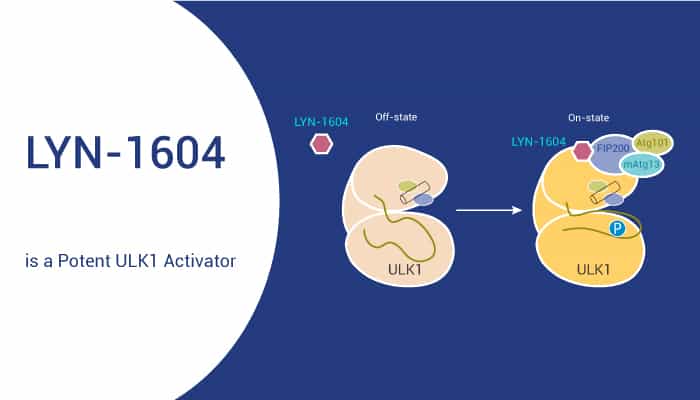UNC-51 like kinase 1 (ULK1) is the mammalian homolog of ATG1. ULK1 is an autophagic initiator that may decide the subsequent cell fate. In the autophagic process, ULK1 is a component of the ULK complex that is essential for autophagy induction in different types of cancer. Additionally, characterization of ULK1 expression in breast cancer tissues has identified that low expression of ULK1 is associated with operable breast cancer progression. ULK1 may be an adverse prognostic marker of survival for patients. Besides inhibiting mTOR signaling, the negative regulators of ULK1 may result in the inhibition of breast cancer growth, suggesting the pivotal role of ULK1 in breast cancer. In a world, the activation of ULK1-modulated autophagy could be a promising strategy for breast cancer therapy. In this study, LYN-1604 is a potent ULK1 activator (EC50=18.94 nM. It can be used for the research of triple-negative breast cancer (TNBC).

LYN-1604 is a potential ULK1 agonist against MDA-MB-231 cells. It binds to wild-type ULK1 with a binding affinity in the nanomole range (KD=291.4 nM). LYN-1604 also induces cell death via the ULK complex in MDA-MB-231 cells. It induces remarkable up-regulation of Beclin-1 and degradation of p62, as well as the transformation of LC3-I to LC3-II in MDA-MB-231 cells. Moreover, LYN-1604 induces ATG5-dependent autophagy via the ULK complex. LYN-1604 can also increase cleavage of caspase3 and induce apoptosis. In addition, LYN-1604 inhibits the growth of xenograft TNBC by targeting ULK1-modulated cell death.
In summary, LYN-1604 has the potential for good therapeutic effects on TNBC by targeting ULK1-modulated cell death. ULK1 agonist is a novel potential small-molecule drug candidate for future TNBC therapy.
Reference:
Zhang L, et al. Chem Sci. 2017 Apr 1;8(4):2687-2701.